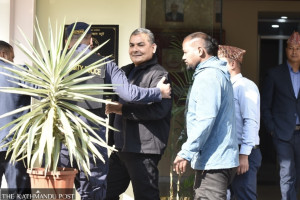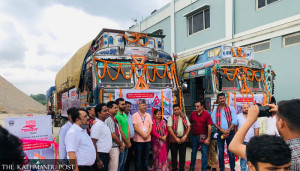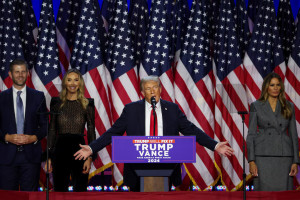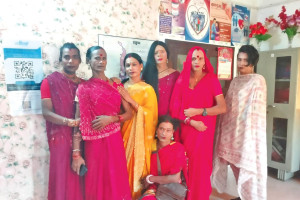National
Nepal readies new BRI deal ahead of PM’s China visit
Chinese Ambassador Chen irked by Prime Minister Oli’s public remarks on loans, media’s debt trap accusations.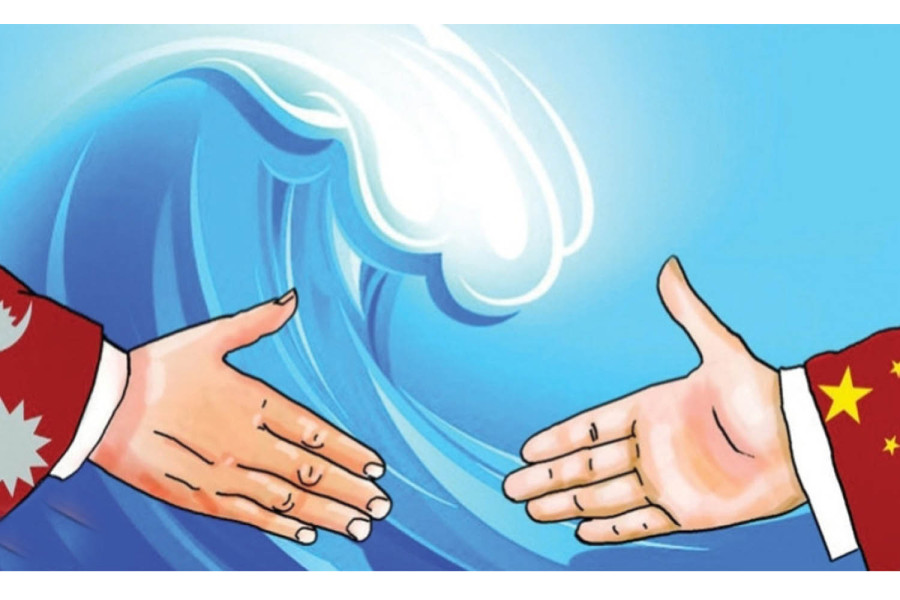
Anil Giri
Seven years after the signing of the framework of the Belt and Road Initiative (BRI), Nepal and China could ink another framework for cooperation on the BRI during Prime Minister KP Sharma Oli’s upcoming visit to China in the first week of December.
A Cabinet meeting on Monday approved the China visit of Foreign Minister Arzu Rana Deuba, which starts Thursday. She will be accompanied by some foreign ministry officials during the visit and meet Chinese Foreign Minister Wang Yi on Friday in Beijing, according to a minister.
Nepal and China had signed the first framework (Memorandum of Understanding) on the BRI in May 2017, but not a single project under it has been implemented. The new framework will prevail over the 2017 agreement in case of disputes or conflicts.
Both sides are now preparing to sign the second framework, an extended version of cooperation document that explicitly focuses on seeking grants from China to fund the projects identified therein.
A top government official told the Post that the document which was prepared by the four-member Nepali Congress and CPN-UML taskforce has landed for final approval at the Office of the Prime Minister and the Ministry of Foreign Affairs. This Nepali version of the framework on jointly building BRI projects has inputs from various government agencies and the Nepali Congress in particular.
“If Prime Minister Oli and Congress President Sher Bahadur Deuba agree to it, the text prepared by the Nepali side will be sent to the Chinese side for final approval. If they also approve, the document will be signed during Oli’s meeting with Chinese President Xi Jinping in Beijing on December 3 or 4,” said the source.
Prime Minister Oli, who is under pressure even from within his party, other leftist parties, and China itself, to sign a BRI-related agreement, has now set aside the BRI implementation plan initially proposed by the Chinese side in early 2020. Instead he has prepared this new counter document titled “Framework for Cooperation on jointly building the BRI,” which will be shared with the Chinese side after the Cabinet’s approval.
According to a foreign ministry official, during a meeting with Foreign Minister Arzu Rana Deuba on Sunday, Chinese ambassador to Nepal Chen Song had criticised Prime Minister Oli and the Nepali media for commenting on various issues of Nepal-China relations.
Ambassador Chen expressed displeasure over Prime Minister Oli’s remarks at a rally in Durbarmarg, where Oli, in front of thousands of people, declared that Nepal would not seek loans from any country. Oli, at the rally on Friday, had also declared that his visit to China would be successful on multiple fronts.
The Chinese envoy was also unhappy with certain media reports in Nepal and India commenting on the latest status of Nepal-China relations, Oli’s upcoming visit, and accusations of a debt trap, an official who was present at the meeting told the Post.
The manner in which the Chinese ambassador expressed his dissatisfaction prompted the Nepali side to come to some kind of agreement with China, said officials and leaders in the know. They were trying to explain why Nepal became ready to sign an amended version of the BRI implementation plan.
Oli had received a green signal from the Nepali Congress, a key ally in the government, to modify the BRI implementation plan into a new framework for cooperation. This four-member taskforce amended several clauses proposed by the Chinese side, according to ruling party leaders, who refused to divulge the actual content.
A meeting between Oli and Congress chief Sher Bahadur Deuba last Tuesday had decided to revise the text of the BRI implementation plan. The title of the document was also changed from “Implementation Plan of the BRI” to “Framework for Cooperation on Jointly Building the BRI,” according to a pair of Congress and UML leaders.
Foreign Minister Arzu Rana Deuba told the Post that the Congress and UML leaders are in the final stages of negotiations on the framework document. The agendas and joint communique of the visit are yet to be finalised.
Prime Minister Oli is scheduled to visit China on December 2, while Foreign Minister Deuba will head for China on Thursday to lay the groundwork for his trip.
On Monday, Oli consulted former prime ministers and foreign ministers at his office and sought advice on Nepal-China relations. While most spoke in favour of strengthening ties with China and maintaining balance with neighbours and major powers, they did not offer any concrete suggestions for the visit.
They were divided on the type of cooperation and assistance Nepal should seek, while some advised that Nepal’s focus should be on implementing past accords and agreements rather than signing new ones.
Several Congress leaders including Dr Shekhar Koirala and former foreign minister NP Saud have been saying that Nepal should not sign an “umbrella agreement” or an agreement covering “comprehensive” issues and that Nepal should not align with any powers.
According to leaders privy to the revised draft, the document retains the areas that were proposed in the BRI implementation plan, but has modified and expanded the content.
The new draft has sections on cooperation background; cooperation principles (joint consultation for common development, pragmatic cooperation for meaningful effects, market orientation with government guidance); cooperation priorities (transport, connectivity and logistic cooperation, trade industrial capacity and investment cooperation); and economic and financial sector cooperation.
Other areas covered are education, science and technology cooperation; intellectual property, measurement, standards, and conformity assessment cooperation; agriculture, forestry and water conservation sector; energy saving and environment protection; geosciences sector; customs clearance; health sector cooperation; and cultural and tourism exchange.
Both the texts—the one from 2017 and the current one—have provisions for cooperation mechanisms.
The new document prioritises grants for sovereign-initiated projects, as instructed by Oli and Deuba.
Earlier China had proposed several financing modalities for BRI projects depending on their financial viability. These included multi-channel funding, innovation of financing models and diversified financing tools.
“The two sides will explore the possibilities of implementing new and innovative project financing instruments, as appropriate, such as public private partnership and blended financing,” according to the BRI implementation plan proposed by the Chinese side.
Ahead of the visit of Prime Minister Oli to China, there was widespread interest about whether Nepal will sign the plan originally proposed by Beijing. A second issue was whether Nepal would accept loans.
Despite reservations from different quarters and communist party leaders, after intense pressure from the Congress, the prime minister had made it clear in public forums as well as during Monday’s consultations with former prime ministers and foreign ministers that Nepal is not going to take loans to finance BRI projects.
During Monday’s meeting, some former foreign ministers including NP Saud had cautioned the prime minister not to sign a comprehensive implementation plan of the BRI. “But there was a tacit understanding even within the Congress that we needed to make some kind of an arrangement on the BRI so that the party could continue in the government,” said one Congress leader. “As we have not seen the content of the new cooperation framework, we cannot comment on that.”
On the day, Congress chief Deuba had discussed the new framework agreement with Foreign Minister Arzu Rana Deuba and Nepali Congress General Secretary Gagan Thapa. Later, the Congress chief flew to Janakpur where he reiterated that while Nepal should accept grants under the BRI, it should avoid taking loans.
“Our debt is now 41 percent of the GDP, which is alarming,” said Foreign Minister Arzu Rana Deuba. “The private sector can take loans but the government is not in a position to do so.”




 20.12°C Kathmandu
20.12°C Kathmandu








